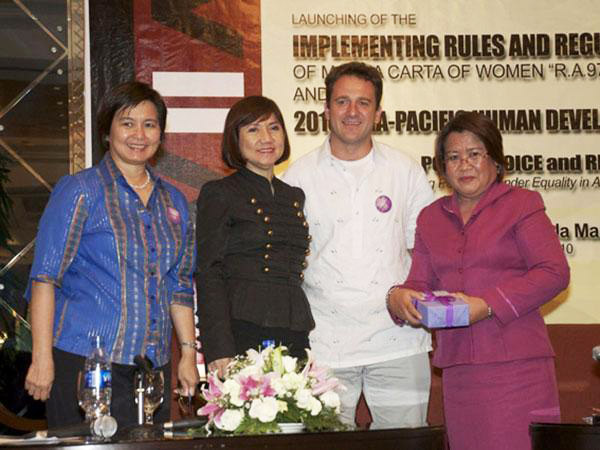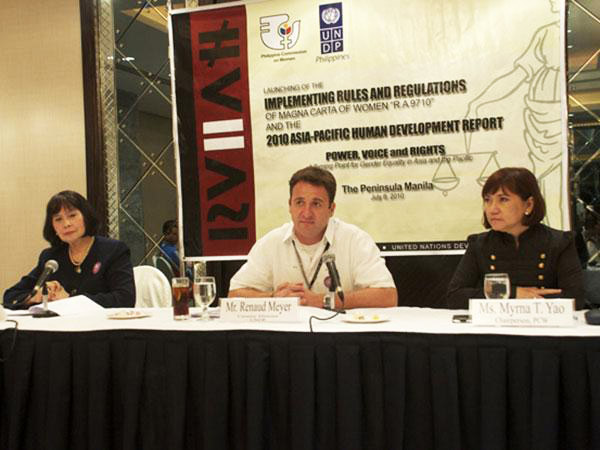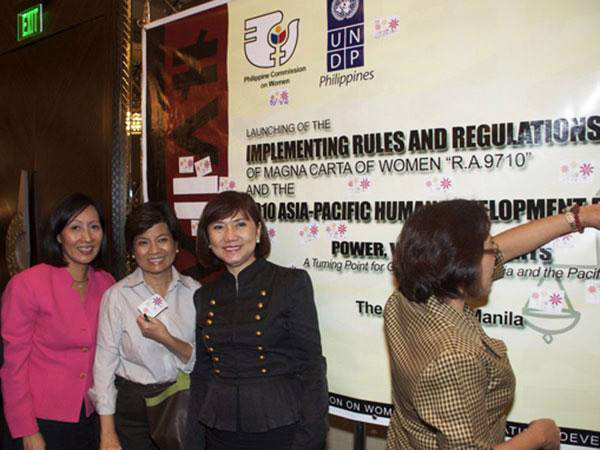R.A 9710 IRR launched, marginalized women rights conferred

Manila – Women now have the Implementing Rules and Regulations (IRR) of R.A 9710 or the Magna Carta of Women (MCW) as anchor in rightfully claiming their rights.
On July 8 at the Manila Peninsula, the Philippine Commission on Women (PCW) and the United Nations Development Programme (UNDP) led the launch of the MCW IRR and the 3rd Asia Pacific Human Development Report (APHDR). The event was participated in by women’s groups, men advocates for gender equality, and representatives from the international development community and from concerned government agencies mandated to implement the MCW.
The main issues discussed in the MCW IRR forum moderated by veteran broadcast journalist Cheche Lazaro focused on the political, economic, social and legal rights of women especially those in the marginalized sectors. AKBAYAN Representative Risa Hontiveros Baraquel, Civil Service Commission (CSC) Commissioner Mary Ann Fernandez-Mendoza, Department of Health (DOH) Assistant Secretary Dr. Paulyn Jean Ubial, Department of Labor and Employment (DOLE) Assistant Secretary Teresa Soriano, University of the Philippines (UP) College of Law Professor Atty. Elizabeth Pangalangan, Women Action Network for Development (WAND) Programme Manager Florencia Dorotan, Center for Migrants Advocacy (CMA) Executive Director Ellene Sana, and Pambansang Koalisyon ng Kababaihan sa Kanayunan (PKKK) Executive Director Trinidad “Ka Trining” Domingo served as resource persons.

PKKK’s Ka-Trining said, “Kami ngang magsasaka marginalized, mas lalo na ang ating katutubo na wala pa ring access to information pati na ang representation and participation” (If we farmers are marginalized, what more are our indigenous peoples who still doesn’t have access to information, representation and participation?). The MCW grants the marginalized sectors the right to food security, livelihood, housing, employment, social protection, representation and participation among others. Moreover, the MCW IRR directs several government agencies such as the Department of Agriculture (DA), Department of Agrarian Reform (DAR), Department of Trade and Industry (DTI), Housing and Urban Development Coordinating Council (HUDCC), and Department of Science and Technology (DOST) to facilitate the implementation of the law’s provisions on marginalized sectors. Rep. Hontiveros stressed that granting of these rights should not be overlooked since these are the most defined MCW provisions.
Marginalized sectors, as defined by the MCW, are those who belong to the basic, disadvantaged, or vulnerable groups mostly living in poverty and have little or no access to land and other resources, basic social and economic services such as health care, education, water and sanitation, employment and livelihood opportunities, housing security, physical infrastructure and the justice system. They comprise of small farmers and rural workers, fisherfolk, urban poor, workers in the formal and informal economy, migrant workers, indigenous peoples, moro, children, senior citizens, persons with disabilities, and solo parents.

The issue on reproductive health drew a lot of reactions from the participants. GMA 7 Assistant to the President Mr. Rod Cornejo asked how the MCW was passed despite the Catholic Church’s dismay over the RH issue. Rep. Hontiveros was quick to answer that relationship with the Catholic Church is maintained by looking at women’s issues with a rights-based approach. Zamboanga City Representative Maria Isabelle Climaco seconded Hontiveros and attested that the passage of the MCW is a “win-win situation between the Church and women including the Muslim women of Mindanao” most especially in terms of peace and development.
Meanwhile, the MCW provision on outlawing the expulsion and non-readmission, prohibiting enrollment and other related discrimination against women students and faculty due to pregnancy outside of marriage was strongly supported by Third World Movement against the Exploitation of Women (TW-MAE-W) Founder Sister Sol Perpiñan. Sister Sol, a member of the religious sector, stressed that double standards should not be applied to female students.
The panel discussion revealed obligations of various concerned agencies in overseeing the law’s implementation. For instance, the Commission on Audit (COA) is directed to conduct an annual audit on the use of the gender and development (GAD) funds by various government agencies. PCW, in coordination with the Commission on Human Rights (CHR) and other agencies, shall monitor and evaluate the implementation of the Act. In addition, CHR shall act as the Gender Ombud and investigate violations on the MCW.
“The presence of guidelines to ensure that the MCW is put into action is a big step in making more women and men get actively involved in overcoming gender inequalities and striving to make women’s rights real”, says PCW Chairperson Myrna T. Yao.

